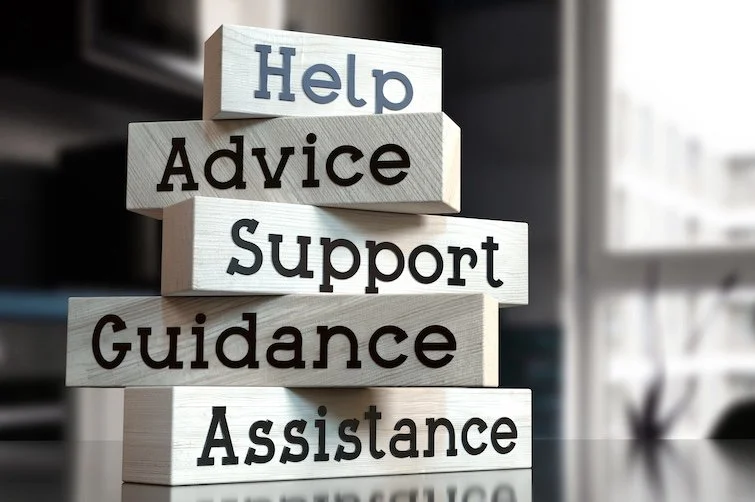Navigating Change: Can I Give You Some Advice?
Whether on social media or podcasts, in magazines and newspapers, on the shelves at bookstores or—let’s not forget—from well-meaning friends and family, advice on dealing with change is never in short supply.
But while change is a universal part of the human experience, there is no such thing as “universal” advice. What works for others may not work for you.
The strategies you choose to implement will be informed by what you know about yourself (e.g., what is “doable” for you) and a variety of intersectional factors and circumstances (e.g., self-identified or societally prescribed strengths and limitations).
As a result, some advice may leave you feeling worse, misunderstood, and frustrated—instead of better, understood, and content.
With that being said, indulge me as I contradict myself and give you some advice on coping with change.
Communicate what you need. A great deal of your energy might be exhausted dealing with a new schedule, new demands, and new emotions. The people around you, as well-meaning as they are and as much as they would like to help, don’t always know the extent to which this is the case in your lived experience.
If you want your friend to listen, for instance, let them know: “What would help me is if I can just talk it out.” Communicating and clarifying what you need can help you get the support you need.
Recognize the upside of change. Change provides the opportunity to explore new possibilities as well as a push to take action: sometimes gently and sometimes without warning. In any of life’s many decisions (e.g., choosing a new house, school, job, relationship, hobby), you are facing uncertainty and the unknown. Everyone has a different threshold of tolerance for these planned or unplanned events. Regardless of how much or how little stress you feel during these moments of change, you will be encountering some level of apprehension. This is normal!
As you learn to tackle the uncertainty of change, you will learn about yourself, increase your ability to seek new opportunities and perhaps even find new meaning in your life. That’s right. There is an upside to change. In his research on life transitions, psychologist L.M. Brammer highlights the favorable outcomes of transitions. These include discovering your capacities, learning for future transitions, and, most importantly, experiencing “an individual renewal process where people set new goals and priorities for their lives.”
Appreciate how difficulty can be meaningful. New encounters and situations in life can facilitate greater self-awareness and understanding—so long as you approach them with a growth mindset. According to Dr. Carol Dweck, author of Mindset: The Psychology of Success, who researches how regulation impacts achievement, a growth mindset “allows people to thrive during some of the most challenging times of their lives.”
Approach setbacks as an opportunity to grow—with the recognition that you are building resilience and, ultimately, confidence.
Consult with your network. Today’s definition of social connection is expansive, spanning beyond friends, neighbors and colleagues. Social support can be instrumental in dealing with stressful life events and change in more positive and less harmful ways. And it’s not hard to find if you know where to look, starting in your own community (e.g., teachers, clergy, counselors) and stretching beyond geographic boundaries through virtual support groups.
Ask yourself: who fits in your definition of a social network? What type of support do those individuals currently provide to you—and you to them? Are there other individuals who you can seek to more directly include to get the most out of the benefits of a social network? As you continuously develop your support network, look for individuals who encourage your independence and problem-solving skills.
Try not to prematurely lend full credence to negative lines of thinking. Unhelpful and sometimes unrealistic thoughts (e.g., “The other graduate students are more qualified than I am” or “I have a hard time making friends because I am quiet”) can leave little room for more positive and sometimes realistic thoughts (e.g., “I have strengths to get me through the program” or “As I learn more about a person, I find it easier to talk to them”) from being able to take a hold and strengthen your ability to persevere.
Thoughts are not always accurate. Yet, under periods of stress and uncertainty, it’s tempting to accept them as unchallenged “truths.” Keeping a check on the accuracy of a thought in relation to where you are at and what you believe can help to better regulate how you think and go about your world.
Be flexible. What matters more than the changes themselves is the way in which you respond to them—including acknowledging certain strategies that appeared to work in your last job, class, or friendship may no longer be relevant or effective.
Each situation brings its own unique set of factors, characteristics, and feelings along with it. When faced with a challenge, consider how you previously coped. If those methods don’t work now, take a moment to reevaluate and explore other options.
It can be frustrating when a previously effective strategy comes up short. Do not take this as an indication that you can’t cope: the strategy is the problem—not you. Utilizing your networks and social supports, researching resources, and taking the time to strategize and self-regulate could help you discover other approaches.
Finally, I leave you with one more—and, maybe, the most important—suggestion.
Be kind to yourself. It is normal to become impatient when navigating change—to want things to fall into place now. But in reality, transitions take time before they feel “normal.” So give yourself some grace and space to ease into any and all of life’s many changes.
And if you find yourself struggling in the process, know that it’s a sign of strength to ask for help. Professional support from a trained psychotherapist can give you the perspective, understanding and confidence to reach the other side of change with greater ease.
Asking for help is a sign of strength.
If you’re interested in learning more about psychotherapy services for you or someone you love, please contact us by submitting this form, or by phone at 847-729-3034. We’ll be happy to answer any questions you might have.



